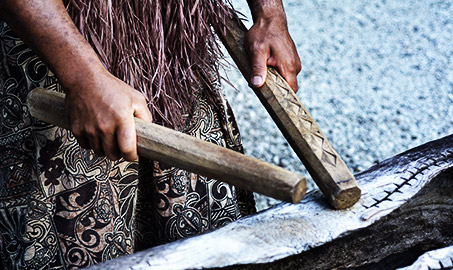Showing empathy as a support worker means you try to understand and ‘connect with’ things from another person’s point of view, or to put yourself in that person’s position.
As a support person you need to display an attitude that is:
- empathetic
- respectful
- caring
- valuing
- supportive
It is useful to ask yourself:
- How would I feel in this situation?
- How would I like to be supported?
- What is important in my culture?
Overall, it is important for support workers to be aware of their own cultural identity and how it may influence their practice. Acknowledging this can help you to be more sensitive to the needs of clients from diverse cultural backgrounds and provide culturally appropriate support.
Reflection
Consider how your own cultural identity may influence your practice as a support worker. For example, a support worker from a collectivist culture may prioritize the needs of the group over the individual, while a support worker from an individualistic culture may prioritize the needs of the individual. This difference in cultural values can impact how a support worker approaches their work, including how they communicate with clients, how they understand the client’s needs, and how they develop support plans.
Supporting a person from a different culture
A support worker who shares a similar cultural background with a client may have an easier time establishing rapport and trust, while a support worker from a different cultural background may need to work harder to understand and appreciate the client’s values and beliefs.

Example: Pacific Cultures
If you are not part of the Pasifika community, you will need to work hard to understand some of the key aspects of Pacific culture that may be different from your own.
For instance, in Pacific cultures, it holds great significance to understand and honour an individual's prayers, ceremonies, and spiritual beliefs. These elements play a vital role in their life and well-being. Be attentive to their references to God, which may be frequent and hold deep meaning. Supporting them in attending ceremonies reflects your respect for their values and traditions.
Cultural customs and protocols have evolved over time and hold immense importance. They represent the authentic and respectful ways of engaging within a specific community. It's crucial to acknowledge and uphold these customs, as they symbolize the right and accepted way of doing things.
By embracing these insights, you'll not only show your respect for Pacific cultures but also contribute to creating a supportive and inclusive environment for the individuals you are assisting. Your understanding and sensitivity will help foster meaningful connections and genuine support.
Family values are “the beliefs, attitudes, and social customs that a family adheres to and promotes, including respect, support, and communication.Scherer & Stinnett
These values often serve as a guide for family behaviour and decision-making and are typically passed down from generation to generation.
Examples of family values may include honesty, respect, responsibility, loyalty, compassion, and forgiveness. These values are often reinforced through family traditions, rituals, and daily interactions. For instance, a family may place a high value on honesty and reinforce this value by encouraging open communication, sharing personal experiences, and addressing conflicts in a straightforward manner.
Family values can also influence decision-making and behaviour. For instance, a family that values education may prioritise academic achievement and encourage their children to pursue higher education.
Similarly, a family that values hard work may emphasise the importance of perseverance and dedication in achieving success.
Watch: Family Values (6:15 - 11.54 Minutes)
Watch the following video from 6 mins 15 seconds to 11 mins 54 seconds. This section emphasizes the importance of mentoring and caring for young people, especially those facing adversity. You will be asked to complete a reflection activity after viewing this video section.
Reflection
Use what you learned from the Family Values video to reflect on the following:
How can you apply the speaker's message about caring for and mentoring young people to your future community work practice? What specific actions or strategies can you implement to be a positive influence and support for the young people you work with? Ideas may include:
- validation and encouragement
- open communication
- cultural sensitivity
- positive role modeling
- advocacy and support
Māori values are the concepts and behaviours important to Māori. This means they are an important area of focus for all health services and providers within Aotearoa New Zealand.
Reflection
Reflect on how much you already know about Māori values. Can you name three values that are important to Māori?
Applying Māori values in the support sector
Learning about Māori values in a health and wellbeing setting will help you to incorporate them into your role as a support worker every day.
By understanding Māori values, you can:
- understand the values of others
- think about your own values and how these might affect others
- understand your organisation and how it works to support people
- help and support others
- advocate for the people you support
- see how Māori values influence your support work
These Māori values may also be relevant to you because you:
- identify as Māori
- support and/or work with people who identify as Māori
- work for an organisation that provides services to Māori as well as non-Māori
- want to work in a way that is respectful of other people’s culture
- want to work in a way that is culturally safe
- want to build relationships with your colleagues and the people you support
The Pacific community, which refers to people from Pacific nations, constitutes the fourth-largest major ethnic group in the 2013 New Zealand Census, following the European, Māori, and Asian ethnic groups. In the census, 295,941 individuals identified with one or more Pacific ethnic groups, which accounts for 7.4 percent of the total New Zealand population.
It's important to note that the Pacific community encompasses a diverse range of individuals, including people who were born in the Pacific Islands and have emigrated to New Zealand as well as people who were born in New Zealand and who identify as Pacific people. Within the Pacific communities of New Zealand, there are distinct differences, and these should be considered with respect to their own unique contexts (Ref: Wilson-Uili et al., 2022).
In the 2018 census, 59.4% of Pasifika identified with a single ethnic group. The biggest Pacific Peoples ethnic groups are:
- Samoan New Zealanders (182,721)
- Tongan New Zealanders (82,389)
- Cook Island Māori (80,532)
- Niueans (30,867)
(Ref: Stats NZ, 2018).
Collectivism
Pacific cultures are more collective than individualistic. In a collective culture people see themselves as part of a group such as a family or community and people think of themselves in terms of their relationships with others. The needs of the group are also important, people choose to prioritise the common good, people are interdependent or need others and group harmony is important. In collectivist cultures there is more collaboration, decisions are made together, and resources are shared. People are expected to conform to the group and there is a sense of obligation and duty.
This well-known quote by Tui Atua Tupua Tamasese Taisi Efi encapsulates this sense of collectivism.
I am not an individual; I am an integral part of the cosmos. I share divinity with my ancestors, the land, the seas, and the skies.Tui Atua Tupua Tamasese Taisi Efi
I am not an individual, because I share a tofi (inheritance) with my family, my village, and my nation.
I belong to my family and my family belongs to me. I belong to my village and my village belongs to me. I belong to my nation and my nation belongs to me. This is the essence of my sense of belonging”.
In Pacific societies, good health is a holistic concept. Pacific people see life and wellness as gifts and as incorporating physical, mental, social, and spiritual wellbeing. One’s ability to fully participate in family and community life is directly associated with being ‘fully healthy’. Being healthy is associated with being a more productive member of family and community, whereas being unhealthy or unwell is associated with the shame and embarrassment of not being able to contribute fully to one’s family and community.
Common values

There are some values that are found across Pacific cultures, which may be called common values, though they may have subtle differences between cultures.
While these values are not unique to Pacific cultures, they influence everyday life and how people interact with each other in any situation.
The Ministry of Pacific Peoples has identified the values important to Pacific people and their families in Kapasa - The Pacific Policy Analysis Tool (Kapasa, 2023). These are described in the activity below.
